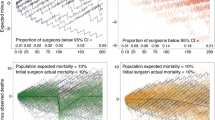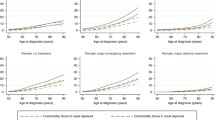Abstract
Purpose
In the new era of revalidation, there is an increasing need to measure surgical outcome objectively. We apply a graphical method, the Variable Life Adjusted Display (VLAD), to esophagogastric resection for malignancy. This technique charts the cumulative difference between expected and actual risk-adjusted mortality over time, allowing observation of performance trends irrespective of case-mix.
Methods
P-POSSUM was applied retrospectively to 182 consecutive patients who underwent resection for esophageal or gastric malignancy in a district general hospital. The primary outcome measured was 30-day mortality.
Results
A total of 168 patients were eligible for inclusion, with a median age of 68 years. The overall 30-day mortality rate was 4.2% compared with 7.1% as predicted by P-POSSUM. The resulting VLAD plot demonstrates an upward trend of better than predicted surgical performance.
Conclusions
VLAD has been hereby applied to esophagogastric surgery and has graphically demonstrated risk-adjusted trends in a single general surgeon’s performance. For qualitative comparative purposes, including recertification, VLAD is judged to be a simple, directly interpretable, and useful technique for monitoring surgical performance.


Similar content being viewed by others
References
Department of Health 2007; Trust, assurance and safety: the regulation of health professionals. Cm7013. London Stationery Office
WHO European Ministerial Conference on Health Systems 2008; Do lifelong learning and revalidation ensure that physicians are fit to practice? WHO Regional Office for Europe, Scherfigsvej 8, DK-2100, Copenhagen
The Bristol Royal Infirmary Inquiry 2001; Learning from Bristol: the report of the public inquiry into children’s heart surgery at the Bristol Royal Infirmary 1984–1995 Cm5207. London Stationery Office
Parsonnet V, Dean D, Bernstein AD (1989) A method of uniform stratification of risk for evaluating the results of surgery in acquired adult heart disease. Circulation 779(Suppl 1):1–12
Lovegrove J, Valencia O (1997) Monitoring the results of cardiac surgery by variable life-adjusted display. Lancet 350:1128–1130
Prytherch DR, Whitely MS, Higgins B, Weaver PC, Prout WG, Powell SJ (1998) POSSUM and Portsmouth POSSUM for predicting mortality. Physiological and Operative Severity Score for the enUmeration of Mortality and Morbidity. Br J Surg 85:1217–1220
Knaus WA, Draper EA, Wagner DP, Zimmerman JE (1985) APACHE II: a severity of disease classification system. Crit Care Med 13:818–829
Copeland GP, Jones D, Walters M (1991) POSSUM: a scoring system for surgical audit. Br J Surg 78:340–355
Wijesinghe LD, Mahmoord T, Scott DJA, Berridge DC, Kent PJ, Kester RC (1998) Comparison of POSSUM and the Portsmouth predicor equation for predicting death following vascular surgery. Br J Surg 85:209–212
Sagar PM, Hartley MN, Mancey-Jones B, Sedman PC, May J, MacFire J (1994) Comparative audit of colorectal resection with the POSSUM scoring system. Br J Surg 81:1492–1494
Zafirellis KD, Fountoulakis A, Dolan K, Dexter SPL, Martin IG, Sue-Ling HM (2002) Evaluation of POSSUM in patients with oesophageal cancer undergoing resection. Br J Surg 89:1150–1155
Tekkis PP, McCulloch P, Poloniecki JD, Prytherch DR, Kessaris N, Steger AC (2004) Risk-adjusted prediction of operative mortality in oesophagogastric surgery with O-POSSUM. Br J Surg 91:288–295
Lai F, Kwan TL, Yuen WC, Wai A, Siu YC, Shung E (2007) Evaluation of various POSSUM models for predicting mortality in patients undergoing elective oesophagectomy for carcinoma. Br J Surg 94:1172–1178
Largarde SM, Maris AKD, de Castro SMM, Busch ORC, Obertop H, van Lanschot JJB (2007) Evaluation of O-POSSUM in predicting in-hospital mortality after resection for oesophageal cancer. Br J Surg 94:1521–1526
Gocmen E, Koc M, Tez M, Keskek M, Kilic M, Ertan T (2004) Evaluation of P-POSSUM and O-POSSUM scores in patients with gastric cancer undergoing resection. Hepatogastroenterology 51:1864–1866
Nagabushan JS, Srinath S, Weir F, Angerson WJ, Sugden BA, Morran CG (2007) Comparison of P-POSSUM and O-POSSUM in predicting mortality after oesophagogastric resections. Postgrad Med J 83:355–358
Dutta S, Horgan PG, McMillan DC (2010) POSSUM and its related models as predictors of postoperative mortality and morbidity in patients undergoing surgery for gastro-oesophageal cancer: a systemic review. World J Surg 34:2076–2082
Steyerberg EW, Neville BA, Koppert LB, Lemmens VEPP, Tilanus HW, Coebergh J-WW, Weeks JC, Earle CC (2006) Surgical mortality in patients with esophageal cancer: development and validation of a simple risk score. J Clin Oncol 24(26):4277–4284
Clinical Resource and Audit Group (CRAG) (2002) Scottish Audit of Gastric and Oesophageal Cancer: Report 1997–2000. Edinburgh: CRAG 2002. Available at: http://www.show.scot.nhs.uk/crag/
Palser T, Cromwell D, van der Meulen J, Hardwick R, Riley S, Greenaway K, Dean S (2010) National Oesophagogastric Cancer Audit. An audit of the care received by patients with Oesophago-gastric Cancer in England and Wales. Third Annual Report 2010. NHS Information Centre, London
Bachmann MO, Alderson D, Edwards D, Wotton S, Bedford C, Peters TJ, Harvey IM (2002) Cohort study in south and west England of the influence of specialisation on the management and outcome of patients with oesophageal and gastric cancers. Br J Surg 89:914–922
Berrisford RG, Veermaootoo D, Parameswaran R, Krishnadas R, Wajed SA (2009) Laparoscopic ischaemic conditioning of the stomach may reduce gastric-conduit morbidity following total minimally invasive oesophagectomy. Eur J Cardiothorac Surg 36:888–893
Author information
Authors and Affiliations
Corresponding author
Rights and permissions
About this article
Cite this article
Guest, R.V., Chandrabalan, V.V., Murray, G.D. et al. Application of Variable Life Adjusted Display (VLAD) to Risk-Adjusted Mortality of Esophagogastric Cancer Surgery. World J Surg 36, 104–108 (2012). https://doi.org/10.1007/s00268-011-1303-4
Published:
Issue Date:
DOI: https://doi.org/10.1007/s00268-011-1303-4




